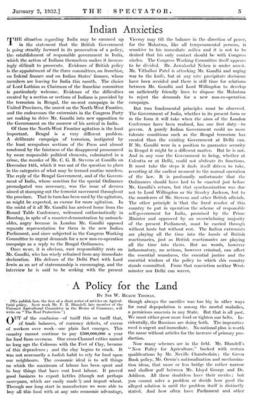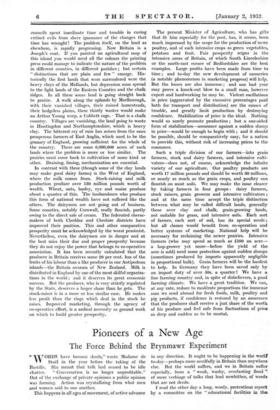A Policy for the Land
Br SIR W. BRACH THOMAS.
(We publish hero the first of a short aeries of articles on Agricul- tural policy. Next week Mr. F. N. Blundell, late member of the Unionist-Agricultural Committee in the House of Commons, will write on " Tho Real Prptection.")
BUT of the confusion—of tariff this or tariff that, 1.--7 of trade balances, of currency defects, of excess of workers over . work—one plain fact emerges. This country cannot continue to pay E500,000,000 a year for food-from overseas. Our cross-Channel critics named us long ago the Colossus with the Feet of Clay, because of this dependence ; and the clay begins to crack. It was not.neeessarily a foolish habit to rely for food upon our neighbours. The economic ideal is to sell things on which the maximum of labour has been spent and to buy things that have cost least labour. It proved good business to export kettles (though not perhaps saucepans, which are easily made !) and import wheat. Through our long start in manufacture we were able to buy all this food with at. any rate economic advantage,
though -always the sacrifice was too big in other ways for rural depopulation is among the mortal maladies, a pernicious anaemia in any State. But that is all past. We must either grow more food or tighten our belts. In- cidentally, the Russians are doing both. The imperative need is urgent and immediate. No national plan is worth the name without articles for the increase of primary pro- duction.
. Now many schemes are in the field. Mr. Blundell's " New Policy for Agriculture," backed with certain qualifications by Mr. Neville Chamberlain ; the Green. Book policy, Mr. Orwin's nationalization and mechaniza- tion ideas, that more or less bridge the rather narrow and shallow gulf between Mr. Lloyd George and Dr. Addison. All these doubtless have their merits ; but you cannot solve a problem or decide how good the alleged solution is until the problem itself is distinctly stated. And how often have Parliament and other
councils spent inordinate time and trouble in curing extinct evils from sheer ignorance of the changes that time has wrought! The problem itself, on the land as elsewhere, is rapidly progressing Now Britain is a Joseph's coat. If you painted an agricultural map of this island you would need all the colours the printing press could manage to indicate the nature of the problem in different counties, in different parishes ; but certain " distinctions that are plain and few " emerge. His- torically the first lands that were surrendered were the heavy clays of the Midlands, but depression soon spread to the light lands of the Eastern Counties and the chalk ridges. In all these areas land is going straight back to prairie. A walk along the uplands by Marlborough, with their vanished villages, their ruined homesteads, their hedgeless plains, these thistly wastes would make an Arthur Young weep, a Cobbett rage. - That is a chalk country. Villages are vanishing, the land going to waste in Huntingdon and Northamptonshire, which is heavy clay. The bitterest cry of ruin has arisen from the once prosperous farmers of East Anglia, which used to be the granary of England, growing sufficient for the whole of the country. There are some 6,000,000 acres of such lands where the problem is more or less similar. The prairies must come back to cultivation of some kind or other. Draining, liming, mechanization are essential.
In contrast with these (though some of the clay lands may make good dairy farms) is the West of England, where the milk comes from. Stock-raising and milk production produce over 130 million pounds worth of wealth. Wheat, oats, barley, rye and maize produce about a quarter of this. 'The husbandmen who produce this form of national wealth have not suffered like the others. The dairymen are not • going out of business. Some counties, notably Cornwall, really flourish, partly owing to the direct sale of cream. The federated cheese- makers of both Cheddar and Cheshire districts have. Unproved their position. This and other comparative prosperity must be acknowledged by the worst pessimist. Nevertheless, even the dairymen are in danger and at the best miss their due and proper prosperity because they do not enjoy the power that belongs to co-operative association. It has been recently calculated that the producer in Britain receives some 20 per cent. less of the fruits of his labour than a like producer in our Antipodean islands—the Britain oversee of New Zealand. Milk is distributed in England by one of the most skilful organiza- tions in the world ; and it deserves its great economic success. But the producer, who is very strictly regulated by the State, deserves a larger share than he gets. The stock-raiser is in a more or less similar case. He makes less profit than the rings which deal in the stock he raises. Improved marketing, through the agency of co-operative effort, is a radical necessity as ground work on which to build greater prosperity. The present Minister of Agriculture, who has gifts that fit him especially for the post, has, it seems, been much impressed by the scope for the production of more. poultry, and of such intensive crops as green vegetables, potatoes and fruit. Fair prosperity reigns in the intensive areas of Britain, of which South Lincolnshire or the north-east corner of Bedfordshire are the best examples. Large profits have been made from time to time ; and to-day the new development of canneries (a notable phenomenon in marketing progress) will help. But the losses are also immense ; and one bad year may prove a knock-out blow to a small man, however expert and hardworking he may be. Violent oscillations in price (aggravated by the excessive percentages paid both for transport and distribution) are the causes of trouble, and greatly limit production by destroying confidence. Stabilization of price is the ideal. Nothing would so surely promote production ; but a one-sided form of stabilization—assurance against a sudden slump in price—would be enough to begin with ; and it should be possible, should be comparatively easy, for a nation to provide this, without risk of increasing prices to the consumer.
Such a triple division of our farmers—into grain farmers, stock and dairy farmers, and intensive culti- vators—does not, of course, acknowledge the infinite variety of our agriculture. Our poultry products are worth 17 million pounds and should be worth 30 millions, or nearly as much as the grain crops, and poultry can flourish on most soils. We may make the issue dearer by taking farmers in four groups : dairy farmers, stock raisers, grain growers and intensive cultivators ; and at the same time accept the triple distinction between what may be called difficult lands, generally those over clay and chalk, grain-growing lands, not suitable for grass, and intensive soils. Each sort of farmer, each sort of soil, has its special needs ; but all classes would benefit from co-operation and better systems of marketing. National help will be necessary for reclaiming the newer prairies. Intensive farmers (who may spend as much as £100 an acre- s hop-grower yet more—before the yield of the acre is sold) need some protection against sudden slumps (sometimes produced by imports apparently negligible in proportional bulk). Grain farmers will be the hardest to help. In Germany they have been saved only by an import duty of over 50s. a quarter ! We have a fine farming country and, in spite of disbelievers, a good farming climate. We have a great tradition. We can, at any rate, reduce to moderate proportions the immense sum we send abroad for fresh foods, milk, poultry and pig products, if confidence is restored by an assurance that the producer shall receive a just share of the worth of his produce and feel safe from fluctuations of price so deep and sudden as to be mortal.







































 Previous page
Previous page